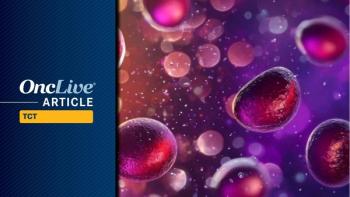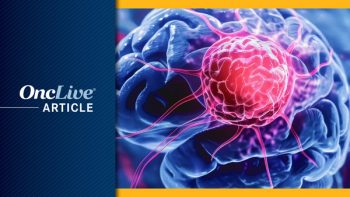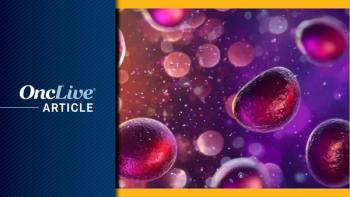
ALLO-501– and ALLO-647–Based Lymphodepletion Well Tolerated in Advanced Non-Hodgkin Lymphoma

Sattva Neelapu, MD, discussed findings from the first-in-human phase 1 ALPHA study which demonstrated encouraging short-term efficacy, along with manageable toxicities, with ALLO-501 and ALLO-647.
Findings from the first-in-human phase 1 ALPHA study demonstrated encouraging short-term efficacy, along with manageable toxicities, with ALLO-501 and ALLO-647, according to Sattva Neelapu, MD, who added that long-term data are needed to determine the durability of response with this approach.
In the single-arm, open-label, phase 1 study, investigators sought to assess the safety and efficacy of ALLO-501 in patients with relapsed/refractory diffuse large B-cell lymphoma (DLBCL) or follicular lymphoma after receiving a lymphodepletion regimen comprised of fludarabine, cyclophosphamide, and ALLO-647.
In the analysis, a total of 22 heavily pretreated patients received treatment. In a 3+3 design, 4 patients received the CAR T-cell therapy at a dose of 40 × 106 following a 39-mg dose of ALLO-647. An additional 4 patients received a dose of 120 × 106 CAR T cells following 39 mg of ALLO-647, while 6 patients received the same dose of CAR T cells after a 90-mg dose of ALLO-647. Finally, 3 patients received the highest dose of 360 × 106 CAR T cells following 39 mg of ALLO-647, while 5 patients received a dose of 360 × 106 following a 90-mg dose of ALLO-647.
At a median follow-up of 3.8 months, results presented during the 2020 ASCO Virtual Scientific Program showed antitumor activity across all cell dose levels with this approach. Specifically, an overall response rate (ORR) of 63% was reported overall, with a complete response (CR) rate of 37%.
Moreover, ALLO-501– and ALLO-647–based lymphodepletion were found to be well tolerated, with no dose-limiting toxicities (DLTs) observed, nor graft-versus-host disease (GVHD) or immune effecter cell–associated neurotoxicity syndrome (ICANS).
“Several potential advantages exist with allogeneic CAR T-cell therapy when compared with autologous CAR T-cell therapy; these potential advantages include reduced manufacturing cost, increased accessibility for patients, and a potentially lower treatment cost,” Neelapu explained. “In addition, because there is no waiting period, more patients can be treated.”
In an interview with OncLive, Neelapu, a professor of Lymphoma and Myeloma at The University of Texas MD Anderson Cancer Center, discussed the potential advantages of allogeneic CAR T-cell therapy compared with autologous CAR T-cell therapy in patients with advanced non-Hodgkin lymphoma.
OncLive: Could you highlight some of the challenges with autologous CAR T-cell therapy?
Neelapu: Two autologous CAR T-cell therapies are currently FDA approved for use in patients with relapsed/refractory large B-cell lymphoma. These products have shown impressive efficacy, with response rates up to 80%; however, only about 35% to 40% of patients achieve long-term remission. Sixty percent of these patients relapse or progress after autologous CAR T-cell therapy for multiple reasons. One is because the CAR T cells are dysfunctional. The T cells in the patient could be affected due to the disease, so the lymphoma itself, or the chemotherapies these patients received prior. If we took CAR T cells from a healthy donor, this challenge could potentially be overcome because the fitness of the T cells would be much better compared with autologous CAR T-cell therapy.
Besides that, other challenges with autologous therapy exist because of the logistics of manufacturing; it is a patient-specific CAR T-cell product. As such, it takes an average of at least 3 to 4 weeks from the time we collect the T cells from the patient to when we can actually administer the CAR T cells to the patient. This challenge could potentially be overcome with an off-the-shelf CAR T-cell therapy approach from a healthy donor.
In addition, approximately 10% to 15% of patients who get referred to our center for commercial CAR T-cell therapy do not end up receiving it. The main reason for this is the delays in the manufacturing, the 3- to 4-week turnaround time. Besides that, if we look at the number of patients who were treated with autologous CAR T-cell therapy in 2019 across the United States, the estimates show that only 20% of patients with lymphoma who need CAR T-cell therapy are actually receiving it. Eighty percent of the patients are not receiving it; I believe that is partly because of the accessibility.
Currently, autologous CAR T-cell therapy is being administered at approximately 80 centers across the United States, which averages out to only 1 to 2 centers per state; this is not nearly enough. To receive autologous CAR T-cell therapy, the patient and the caregiver need to travel to a CAR T-cell therapy center and must stay local for at least 5 to 6 weeks, which is not practical for most patients.
On the other hand, if you were to have an off-the-shelf CAR T-cell approach, it could potentially improve the accessibility because it simplifies both the logistics and the infrastructure that is required to administer the therapy. For example, [for a center to be able to administer] allogenic CAR T-cell administration, all they would need is a liquid nitrogen freezer to be able to freeze the product and keep it in storage until administration to the patient; of course, this is in addition to the standard infrastructure required for patient monitoring and management of any AEs.
Could you shed light on ALLO-501 and its properties?
ALLO-501 is an allogenic CAR T-cell therapy product that is made by introducing a CD19 CAR T molecule into healthy donor T cells. However, to be successful, allogeneic CAR T-cell therapy must prevent GVHD. Also, the rejection of the CAR T cells by the host immune system also needs to be minimized. With ALLO-501, in order to minimize the risk of GVHD, the T-cell receptor is knocked out using transcription activator-like effector nucleases gene editing technology.
To prevent the rejection of the host or improve the persistence of the donor CAR T cells, the CD52 receptor is knocked out and that allows the administration of ALLO-647, which is an anti-CD52 monoclonal antibody; this depletes the host T cells, but not the donor CAR T cells if they don't express CD52. It allows the expansion of donor CAR T cells and improves their persistence.
Could you expand on the design and methods that were employed in the phase 1 ALPHA trial?
ALLO-501 and ALLO-647 were tested in a phase 1 multicenter, dose-escalation ALPHA study that was conducted at 6 centers in the United States. To be eligible to participate, patients had to have either relapsed/refractory DLBCL or follicular lymphoma after at least 2 lines of therapy. Once the patients were enrolled on the trial, they received the lymphodepletion regimen, which consisted of cyclophosphamide and fludarabine, along with ALLO-647, which is the CD52 monoclonal antibody. On day 0, they received a single infusion of the CAR T-cell product. Three dose levels for the CAR T cells were tested on this study: 40 × 106, 120 × 106 and 360 × 106.
In addition, we also tested 3 different lymphodepletion regimens on this study to try and optimize the lymphodepletion and improve the CAR T-cell persistence. Across all 3 lymphodepletion regimens, the dose of the cyclophosphamide and fludarabine was fixed at the standard dose of 90 mg/m2 for fludarabine and the 900 mg/m2 dose of cyclophosphamide given over 3 days.
Two dose levels of ALLO-647 were tested: a low dose of 39 mg and a high dose of 90 mg; these doses were given over 3 days, either concomitantly with cyclophosphamide and fludarabine or in a staggered manner. Once the patient received the lymphodepletion and CAR T cells, the first tumor assessment was done on day 30.
What did the results show in terms of efficacy and safety?
In terms of safety, we found that both ALLO-501 and ALLO-647 are quite safe. We have not reached a DLT to date. We also did not observe GVHD in any of the patients. Twenty-two patients were evaluable for safety.
We also have not observed any neurological toxicity or ICANS that can often occur with CAR T-cell therapy. We observed cytokine release syndrome (CRS) in about one-third of the patients, which were mostly grade 1 or 2. Only 1 patient experienced grade 3 CRS, although it was reversed within 48 hours.
We also observed infusion reactions with the ALLO-647 antibody infusion, which is not unexpected; that occurred in about half of the patients. However, these effects were all completely reversible and did not prevent the dose administration of ALLO-501 in any patients. Moreover, in about half of the patients, we found evidence of infections; most of these were completely asymptomatic and they were picked up on our weekly pathologic complete response monitoring that we were doing in these patients; they were found to be [easily] reversible with antiviral therapy.
In terms of efficacy, at the time of data cutoff of May 11, 2020, 19 patients we evaluable for efficacy. The best ORR that we saw was 63% and the CR rate was 37%. The dose escalation [portion of the trial] has been completed in the low-dose ALLO-647 and is ongoing in the high-dose ALLO-647. So far, even though the follow-up is only about 4 months, the CR rate appears to be greater with high-dose ALLO-647 conditioning at 50% versus 27% with the low-dose ALLO-647 conditioning.
What are the next steps of this research?
As previously mentioned, enrollment is ongoing for the high-dose ALLO-647 conditioning and the high-dose ALLO-501. We would like to know what the durability of the response is, as well; as such, longer follow-up is also needed for these patients. With median follow-up of 4 months, 75% of the responses are ongoing, which is very encouraging and reassuring. The CAR T-cell expansion in these patients also appeared to be associated with deeper remissions, with a higher degree of CRs, as well.
In terms of the next steps, once we optimize the lymphodepletion regimen [and the] ALLO-501 [dose], the goal is to take this to a registration trial. A slight modification has been made to the ALLO-501 product. Currently, the CAR T-cell product has a rituximab (Rituxan) safety switch which has been removed to allow broader eligibility of the patients. The new product is now called ALLO-501A and is being tested in the ALPHA-2 study. This study already started enrollment.
Is the ultimate goal of this research to have allogeneic CAR T-cell therapy replace autologous therapy?
The data are quite reassuring. The safety of allogeneic CAR T-cell therapy, as well as the short-term efficacy in terms of overall response and the CR, is approximately in the same ballpark as what we have seen with autologous CAR T-cell therapy. Longer follow-up is needed to determine the durability of response [with this approach], but the efficacy is ultimately comparable.
Hopefully it will also improve the accessibility for administration of CAR T-cell therapy and more patients can be treated. Because of the fact that a large number of doses can be generated from a single product, the cost of manufacturing is much less than what we see with an autologous CAR T-cell product.
Reference
Neelapu SS, Munoz J, Locke FL, et al. First-in-human data of ALLO-501 and ALLO-647 in relapsed/refractory large B-cell or follicular lymphoma (R/R LBCL/FL): ALPHA study. J Clin Oncol. 2020;38(suppl 15):8002. 10.1200/JCO.2020.38.15_suppl.8002



































